| Ryan Sanderson |
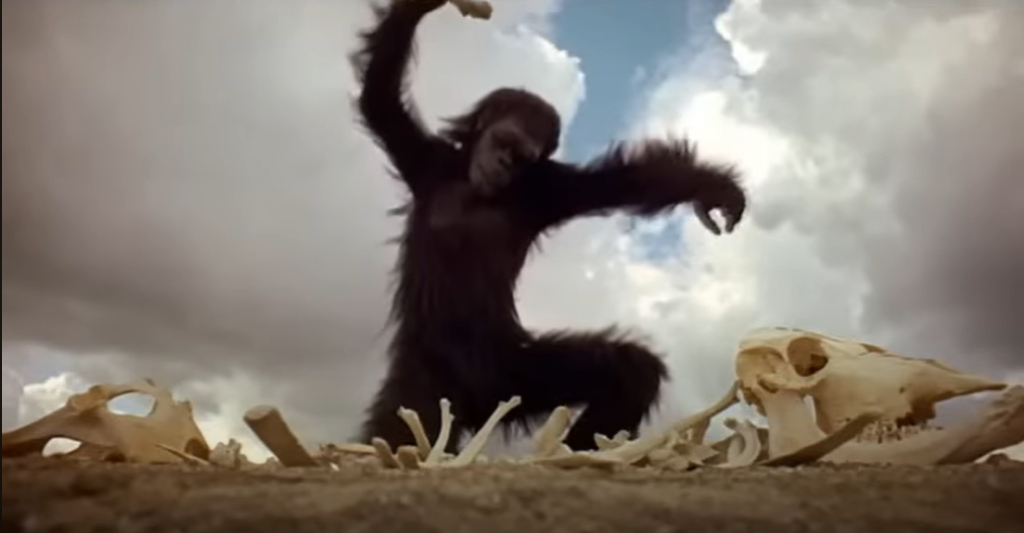

There Will Be Blood plays on glorious 35mm at the Trylon Cinema from Thursday, March 27th, through Tuesday, April 1st. No joke! For tickets, showtimes, and other series information, visit trylon.org.
“Shuffle the cards, and deal a new round of poker hands: they differ in every way from the previous round, and yet it is the same pack of cards, and the same game, with the same spirit, the players grim-faced and silent, surrounded by a haze of tobacco-smoke.” – Upton Sinclair, Oil!
I’ve watched There Will Be Blood at least half a dozen times over the last eighteen years. It’s grown alongside me, like great films tend to do. The version I encountered in 2007 as an evangelical teenage film student was difficult, an unflinching negation of popular myths, of benevolent tycoons and godly prophets, of any misguided or nefarious idealizations of America’s past. I found the experience unpleasant.
Revisiting the film last month, I felt freed to take its sharpest edges for granted—which revealed a much more interesting, playful, funny film lying in wait beneath the surface. This doesn’t negate my initial read, which I think was very much true to the movie. Jonny Greenwood’s score feels like it’s thudding towards an apocalypse for a reason. But as much as I would never vote for or donate money to Daniel Plainview or Eli Sunday (Paul Dano), I nevertheless feel drawn to them, empathize with them, even root for them from time to time. I no longer see them as aberrant monsters I’m pressured to condemn, but heightened reflections of forces at work in every human.
Revisionist Westerns made a comeback in 2007. Andrew Dominik humanized (and banalized) the American folk hero with The Assassination of Jesse James by the Coward Robert Ford. No Country for Old Men upended the man-on-the-run motif to remind audiences of their own frailty, pitted against the human capacity for cruelty and violence. 3:10 to Yuma played nicer with existing cinema mythology, making only minor adjustments, like James Mangold usually does. Viewed from that same big picture perspective, There Will Be Blood took aim at the great man theory of history, the obvious truth hiding behind stump speeches—here are the sorts of bastards who tend to gravitate towards money and power.
Not all accidents are wholly accidental. In retrospect it makes sense that some of America’s most innovative filmmakers tackled the subject of American credulousness shortly after the President said he invaded a country under false pretenses because God told him to. Anderson admitted to some of his motives when Charlie Rose asked why he chose the subjects of oil and business for his follow-up to Punch Drunk Love: “I’m not living in a bubble.” Upton Sinclair’s Oil! is a political—you could even argue allegorical—work that references real people and real events to support the author’s political worldview. I suspect Anderson adapted the novel for similar reasons, maybe one degree further removed.
America was once again emerging from a patriotic fury and descending into an economic depression alongside two forever wars. The art that captured the public imagination (or at least my attention) that not-so-magical fall of ‘07 was short on high-minded, soaring rhetoric about better selves (sorry, Lions for Lambs). It was more like a cold glass of water dumped on the audience’s heads in the middle of the night. These revisionist Westerns served the same function as their sixties and seventies forebears, scouring the mythos that convinced the most powerful country in the world that monstrous things were necessary evil, and thus good, illuminating what most people understood deep down in the heart of their bullshit meters
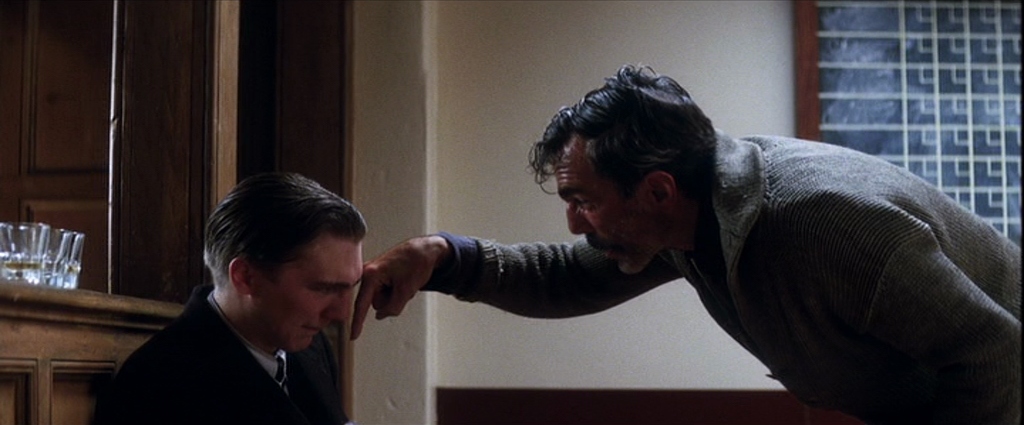
Anderson has never outright disowned the implications of political allegory—that Eli symbolizes Religion writ large, Plainview Business, that their uneasy, temporary alliance ought to evoke direct comparisons to a relationship that has dominated American power the last century and a half; not the same way he denied, say, The Master being about Scientology. Even if he did, it wouldn’t be convincing. You don’t adapt a 300,000 word book written by one of America’s most famous socialists for wholly apolitical reasons. And I don’t think you add a wayward religious undercurrent to that story during the presidency of George W. Bush wholly on accident. Eli and Daniel are both charlatans. One sells credibility and authority, the other his piety—both approaches used to successfully hoodwink Americans to this day.
But that’s the film at its most simplistic. Eli and Daniel’s public personas are not so difficult to see through once you know what you’re looking for. The question that follows is more difficult: who are they, actually? And here the film occupies a more metaphysical space; because of course they’re us, just like all of history’s monsters, the same playing cards dealt in a different order.
While you could pitch turn-of-the-century American oilman Daniel Plainview as a mirror to Dick Cheney, George Bush, or the business leaders benefitting from Bush’s “compassionate conservatism,” he’s also not so different from other Paul Thomas Anderson avatars like Jack Horner, Reynolds Woodcock, or Gary Valentine, an uncompromising visionary, willing a staggering vision onto reality. He’d sooner abandon his child or be publicly humiliated by his most hated rival than take the easy money and let someone else shape his masterpiece. Not wholly incomparable to a filmmaker who spent two years drumming up support for his idiosyncratic industrial western when massive Hollywood paychecks were always available; or an actor who lived separately from his wife and children for extended periods to immerse himself in a role.
In this regard, There Will Be Blood is a nightmare inversion of its creators’ own work, their skill sets weaponized for exploitation, their rigorous, uncompromising natures metastasized into misanthropy and violence. It’s not hard to find creative parallels for everything Plainview says and does. Other filmmakers have abandoned their parental responsibilities entirely, or put their crew’s lives in danger to get a perfect shot. I’m sure many a filmmaker has wanted to attack a difficult studio executive the same way Daniel does when he realizes he needs Eli’s blessing to complete his masterpiece. The film is not content to gawk at the destruction in obviously destructive minds. It must find that destruction in its creators and audience, in humanity as a whole.
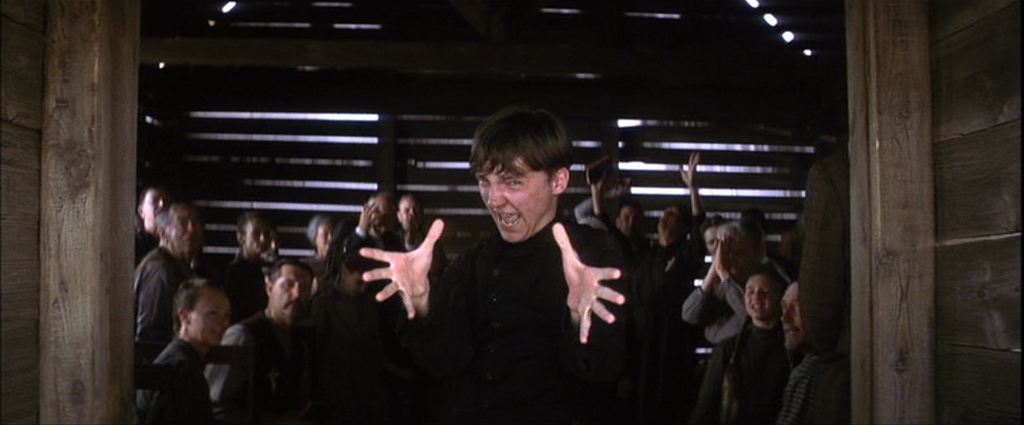
But it’s not all miserablist doom and gloom. The movie also finds strange and funny and even beautiful aspects of its characters. Consider Plainview’s baptism, which I forgot was the funniest thing I’d ever seen. The best moment comes when Daniel discovers halfway through his public humiliation that he’s actually kind of into it. Some deep, animal part of him longs to confess and be corrected. A man who devotes his life to always negotiating from a place of power discovers the pleasure of subbing before God. The rapture he feels in his humiliation infuses him with enough humanity to reunite with his son. It’s the closest the film comes to admitting some legitimacy to Eli’s religion, to the healing power of submission—a semi-BDSM come-to-Jesus moment inflicted on an old-timey mustachioed businessman kneeling before a cross. God bless you, PTA.
Plainview’s annoyance with Eli is also much funnier than I remembered. Here’s a man reshaping the world in a permanent, irrevocable way, driven by murderous rage at an annoyingly pious child. (It reminds me of people who use aggressively woke teenagers as an excuse for flirting with fascism.) Plainview seeks wealth and power, at least in part so that he no longer feels obligated to hide the worst of himself. I suspect most people would find Eli annoying, self-aggrandizing, clearly angling for his own personal gain under the guise of piety. Most people would not bludgeon him to death with a bowling pin, probably. The difference between monstrous and relatably human seems to lie in how obliged one feels to act on an impulse with impunity, which, of course, is what Daniel and men like him are fighting to achieve. If that’s scary, it’s also comedically unreasonable.
Daniel Day Lewis’s Daniel Plainview is not simply one of the greatest performances in movie history; he’s also one of cinema’s most brilliant clowns, teetering like Charlie Chaplin in roller skates between the absurdities that define his time and life. He’s a formerly destitute miner now in possession of godlike amounts of wealth. He’s a man who spent years alone in a hole, whose primary job is managing other people. He’s driven almost exclusively by his volcanic ego, but succeeds only insofar as he can convince the public that he’s safe and reasonable. His true nature explodes through every effort at civilization, like oil through California hardpan.
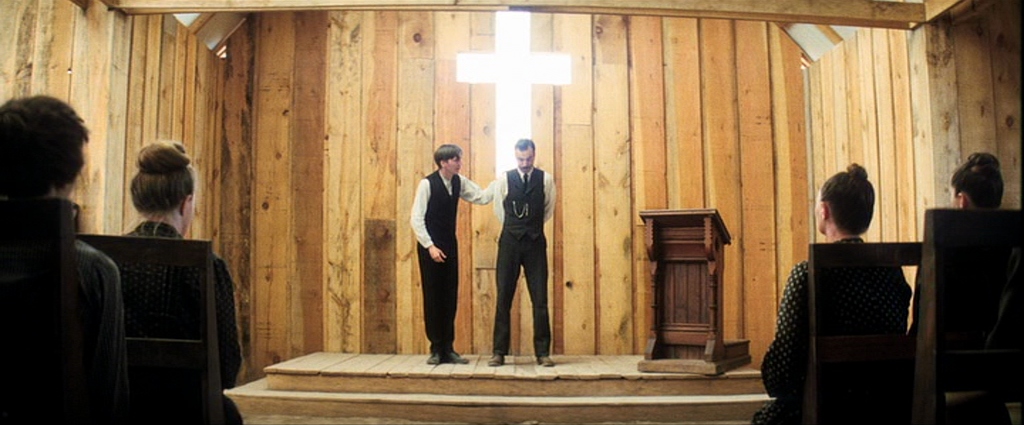
In most cases Paul Thomas Anderson is the antithesis of a political director. His films feel almost exclusively personal, inviting the audience very specifically and with great effort to a space that exists outside any shared ideology. He fills his films with unlikable, even problematic characters and relationships, and uses them for reasons beyond moral condemnation. But There Will Be Blood is different. It works even if you remove politics entirely, but nevertheless, its characters are the men who built this country, from whose image it stubbornly refuses to budge. Perhaps, like the rhyming images I chose to open the piece, There Will Be Blood offers itself as a chapter in the evolution of humanity, one that’s lasted about two hundred years, wherein a certain kind of man hijacked evolution, unwilling to allow this world he’s seized to progress beyond him.
In a 2019 interview (part of a series about the best films of the twenty-first century), Betsy Reed of the Guardian asked Paul Thomas Anderson, “Do you think the film feels like a yet more urgent prophecy today? Of bleeding the Earth dry, of allowing greed to triumph over human relations?”
Anderson replied, “Unfortunately, this story doesn’t seem to be going out of style any time soon. It would be nice to see it as science fiction one day. Or an account of how truly insane we all once were.”
I’ve seen Anderson use this rhetorical, theoretical optimism before when asked about the bleaker implications of his work. The romance of “what if?” might even be the guiding force of his cinema. The shallowest man in the world cries on his father’s deathbed in Magnolia. A shell-shocked soldier finds some peace by learning from a cult leader in The Master. Comfort in the boundless uncertainty of things. “These strange things happen all the time.” Or, as Inherent Vice puts it: “May we trust that this blessed ship is bound for some different shore, risen and redeemed, where the American fate mercifully failed to transpire.”
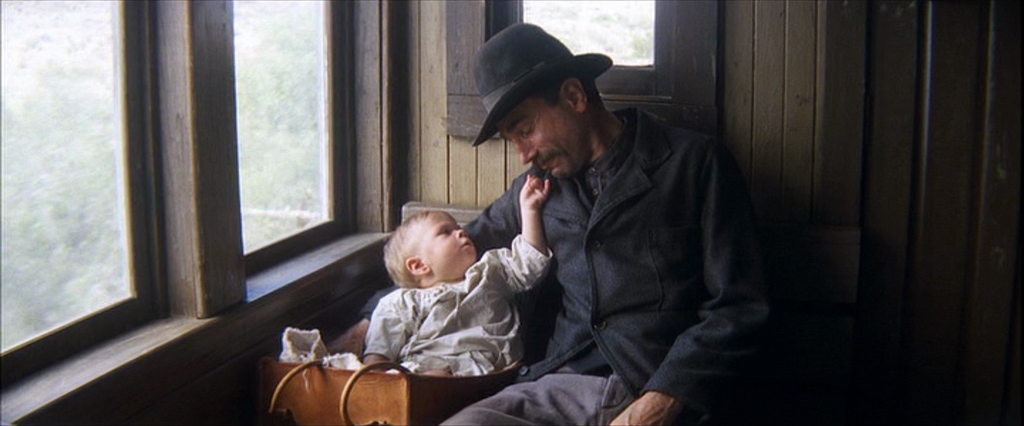
For all its aesthetic bleakness, There Will Be Blood shares this romantic edge. Daniel’s adopted son, H.W. , finds love and the inner courage to leave his father behind. I was shocked on my recent rewatch by how affecting this sequence is. Plainview has fought his whole life for the right to be cruel to whoever he wishes. He is not obligated to be kind to his son, so he will not be. But this is not the most important part of the scene. Instead, H.W. steals the moment and possibly the role of film’s protagonist, maintaining his composure, gathering enough strength to leave his father for good. It’s a reminder that the film does not wholly share Plainview’s misanthropy. He may see and embody the worst in people–his efforts and the efforts of men like him may bring doom and destruction down upon the world–but a better path is, and has always been, possible. The film even breaks its own visual language with a single flashback, affirming H.W.’s memory of their relationship over Daniel’s cruel dismissals, reminding the viewer with authorial definitiveness that Daniel is not the calloused bearer of uncomfortable truths. The sharpness he’s afforded by his predatory ego is narrow and hopelessly skewed.
H.W. tells his father, “you taught me to love what I do,” an effort at conciliation. I suspect the filmmakers admire this aspect of Daniel’s personality as well. Call it madness, call it passion: H.W. sees the good in this one corner of his adopted father, even while he makes a clean break in every other sense. Somewhere in the origins of this bloody, cynical enterprise lies raw human ingenuity, a Kubrickian montage from a lone man dragging a busted leg up a well, to a makeshift system of levers and pulleys, to fields full of oil derricks plumbing the earth’s wealth, all in a handful of years. There’s beauty here alongside terror, evidence of creativity and passion harnessed to terrifying heights–the same power implicit in the work of many of the film’s creators, evident in the content of their art and how they create it. What might be done, what might be undone if such astonishing power is properly harnessed?
But first, H.W. must meet his father’s gaze, hold onto himself, and choose to go another way. He will not return his father’s cruelty–nor will he succumb to it. Before the film’s final, most devastating prophecy, we see one young man, empowered by love, choose a different path.
Daniel Day Lewis offered his own empathetic spin on Daniel Plainview and men like him: “If you compare that fever [of creativity] to the fever of prospecting—those guys who knew what they were after, which was the vast mansion on the pacific coast—by the time they had accumulated enough wealth to build that pyramid for themselves, the work was actually an end in itself. The fever was the thing that they lived for… regardless of who’s a witness to it, or how much you can portray the value of that life to a certain extent.”
But Daniel Plainview’s not humble enough to see himself in this light, just as he can’t accept love outside the strictures of blood relations (and after enough time, it feels like even this is beyond him). His refusal to accept a world outside his own limited perspective dooms him to make the same miserable choices over and over. Therefore, when we find him at the end of the film, he’s not doing the work that brings him joy. He’s drunk, asleep in his bowling alley. The bold frontier is long-since subdued. Now he’s bored senseless in his wealth, free to succumb to the demons of alcoholism and loneliness once and for all. After a long, tumultuous life, he winds up back where he began, a self-fulfilling prophecy, alone in a larger, more ornate mine, determined to bring everyone else down with him.
Edited by Matthew Tchepikova-Treon
